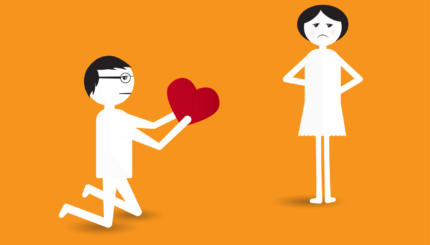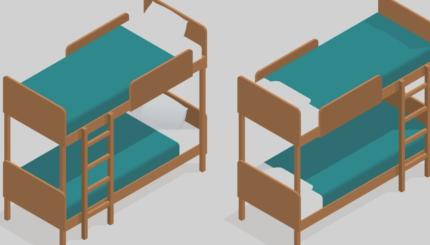Zach’s girlfriend has become his whole world, but it doesn’t seem like she feels the same way. She’s constantly putting him down in front of his friends, and she throws a fit every time he even asks another girl for the math homework. Zach’s friends never see him anymore and wish that he could wake up and see how miserable she makes him. But Zach isn’t sure if his relationship is unhealthy or just intense — and he’s afraid to do anything about it.
I think I might be in an unhealthy relationship. What do I do?
A relationship doesn’t need to be physically violent in order to be abusive. If your partner puts you down, violates your boundaries, or pressures you to do things you don’t want to do, you could be in an unhealthy relationship – see our overview for more warning signs. There are several steps you can take once you recognize that your relationship may be making you feel uncomfortable:
Consider if the relationship is unhealthy—or just unfulfilling.
You don’t need a huge or elaborate reason to want to break up with someone. Just wanting to end it, and not understanding why, is enough.
If the relationship is unhealthy or you’re afraid of ending it, set up a safety plan.
-Break up with your partner in a public place—you can even bring a friend for backup.
-Break up via text. (Yes, it is usually considered rude, but if you’re afraid for your safety, it might be the best option.)
-Make sure you’re with people who love and support you — like a friend or family member—when you break up with your partner, or immediately after.
-If you aren’t sure how to break up safely, contact Loveisrespect, where where a trained counselor can help you create a safety plan that works for you.
-Talk to an adult you trust. He or she will help keep you safe and support your decision to leave, even if you aren’t sure.
I think a friend may be in an unhealthy relationship. What do I do?
First off, know the warning signs. Your friend may be in an unhealthy relationship if:
-You notice your friend’s boyfriend or girlfriend treating him or her poorly — yet your friend constantly makes excuses about the partner’s behavior.
-You’ve seen their partner get violent or have heard from your friend about violence (even just once!).
-Your friend is always worried that their boyfriend or girlfriend is upset with them, or they often express fear that their actions will anger their partner.
-She has injuries that don’t make sense and/or she gives unlikely excuses for new injuries.
-His partner is extremely controlling, jealous, or short-tempered and violent.
-She says she wants to leave a relationship but they “can’t”…for whatever reason.
Be supportive of her decisions.
-Your friend may choose to stay in an unhealthy relationship, or may miss her partner after they end an unhealthy relationship.
-You want your friend to be comfortable talking to you about his feelings, even if you don’t agree with his choices.
-Focus the conversation on your friend—not on his or her partner.
-Say things like, “I’ve noticed that you’ve been really anxious since you started dating Adam,” rather than, “Ella is so annoying, you should break up with her.”
-Your friend should know that you’re there for her — not just against her partner.
Don’t get involved, except by being there for your friend.
-Never post anything online about your friend’s ex or current partner.
-Don’t threaten his ex or partner, and don’t break up on behalf of your friend (unless your friend asks for your help).
Help your friend recognize the signs of an unhealthy relationship.
-He may not know that the way he’s being treated isn’t normal, or he may wrongly believe that the abuse is deserved.
-Remind her that everyone deserves a healthy, respectful relationship.
If you aren’t sure if your friend is in an unhealthy relationship — or if you aren’t sure how to help your friend get out of a relationship safely — contact Loveisrespect to speak with someone who can help you figure it out. Its staffers are trained to answer you questions about relationships 24/7.
Special thanks to our experts:
-Dr. Gary Lewandowski, Professor and Chair of the Department of Psychology at Monmouth University and editor of ScienceofRelationships.com
-Dr. Jill Murray, psychotherapist and teen relationship expert
-Brian Pinero, Chief Programs Officer for the National Domestic Violence Hotline and Loveisrespect






